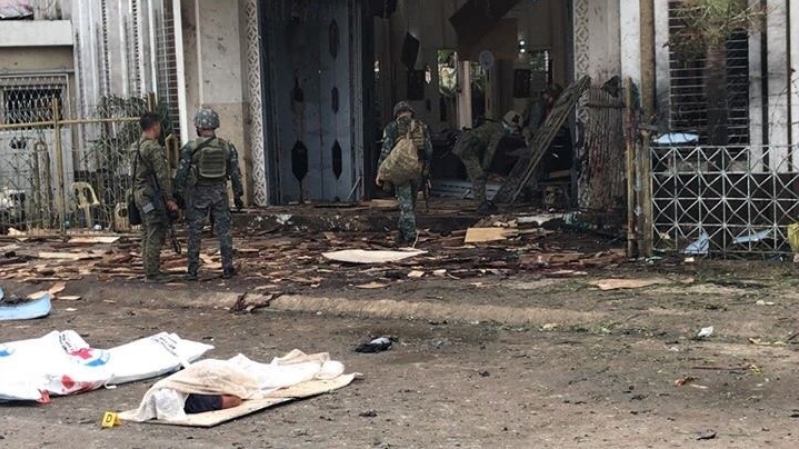
Christians in the insurgency-scarred southern Philippines who hoped for peace after the region won official status as an autonomous, Islamic sub-state last month received a mortifying message when Islamist terrorists bombed a Catholic cathedral on Jan. 27.
Members of the Islamic extremist rebel group Abu Sayyaf, which claims allegiance to Islamic State, aided the suicide attack and turned themselves into authorities over the weekend, lending credence to speculation that Islamist terrorists were sending a message in the bombing: There will be no peace.
Interior Secretary Eduardo Año stated on Friday (Feb. 1) that Islamic State-affiliated terrorists were responsible for the twin suicide bombing of the worship service at Our Lady of Mt. Carmel Cathedral in Jolo, Sulu Province, which killed at least 22 people and wounded more than 100 others.
Islamic State (IS) representatives took responsibility for the bombings in online postings shortly after the explosions, one inside the cathedral on Jolo, a small island off the coast of Mindanao, and another about 12 to 15 seconds later outside the doorway. Año said two Indonesian suicide bombers, one who went by the nom de guerre Abu Hud and his wife (unnamed), were guided by local rebels from the Islamic extremist Abu Sayyaf, which claims allegiance to IS.
Abu Sayyaf was excluded from the rebel-government negotiations that led to the Jan. 21 referendum that put five provinces under the Bangsamoro Autonomous Region in Muslim Mindanao (BARMM), with the rebel Moro Islamic Liberation Front (MILF) heading a group taking over administration. Abu Sayyaf rejected the peace deal that created the BARMM, preferring instead that the region belong to a broader southeast Asian caliphate.
Results of the referendum were announced on Jan. 25; two days later, the Indonesian couple aided by Abu Sayyaf bombed the cathedral. Año said local terrorists who aided the attack included Kamah Pae, a member of the Ajang Ajang, a sub-group of Abu Sayyaf, and Hatib Hajan Sawadjaan, who is said to have succeeded former Abu Sayyaf leader Isnilon Hapilon, who was killed when he led a five-month rebel siege of Marawi, Mindanao, in 2017. These groups have sworn allegiance to IS, according to Año.
Kammah Pae and four other Abu Sayyaf rebels turned themselves in to authorities over the weekend, security officials announced today (Feb. 4). Oscar Albayalde, the national police chief, said at a news conference that Kammah Pae conspired with the Indonesian couple who blew themselves up, according to the Straits Times. Authorities are searching for 14 other suspects.
In a 2015 video, Islamic State leaders stated that 16 of their 35 "provinces" were outside Iraq and Syria, including one in the Philippines, according to The New York Times.
Suicide bombings are rare in the Philippines, and Año reportedly said the Indonesian bombers sought to sow sectarian dissension and set an example for other terrorists on the islands.
Life under Islamist Administration
MILF Chairman Murad Ibrahim told Philippine media that the new Bangsamoro Organic Law (BOL) creating the officially Islamic region aims for peace and "will protect not only the rights of Muslims but also non-Bangsamoro [non-Muslims], like Christians."
He and local Christian leaders condemned the Jolo cathedral bombing.
"We condemn this act of terrorism that has taken place only days after the plesbiscite on the BOL as we also condole with the families of several soldiers and civilians who were killed by the explosion," Catholic Bishop Conference of the Philippines (CBCP) leader Romulo Valles said.
While some Christians are concerned as a result of the attack and wary of the Islamic government transition - Sulu Province voted against the referendum measure - they plan on continuing to live out their faith.
House-church leader Lon Tabuena, who operates a ministry for indigenous children in Bongao, Tawi-Tawi Province, said he has participated in BOL forums in order to better understand what the new Islamic government will look like. The five provinces under BARMM are home to a number of Christian communities and churches established by foreign missionaries as early as the 1900s.
Tabuena told Morning Star News that people will still be able to exercise freedom of religion, and he is optimistic that Christians will not be marginalized, as they will have two seats when the new parliament under the new Islamic sub-state is formed in 2022.
The MILF's peace pact with the Philippine government, signed by President Rodrigo Duterte last July, is designed to end nearly 50 years of armed conflict in the southern Philippines. With about 12,000 heavily-armed fighters, the MILF is the largest Islamic revolutionary force in southeast Asia.
It is a breakaway faction of the Moro National Liberation Front (MNLF), led by Nur Misuari. When the MNLF begun to hold a previous peace dialogue with the Philippine government, the MILF was against it and defected.
Sensing the armed conflict with the MILF had no signs of ending after more than a decade, the Philippine government with the support of the international community begun opening peace talks with Islamic separatist rebels. In 2014 the government and the MILF signed an agreement on how the peace process would be implemented.
According to the agreement, 2019 is a period of transitioning from the Autonomous Region of Muslim Mindanao (ARMM) to the new BARMM (adding "Bangsamoro," or "Nation of Moros," moros being a colloquial term for Muslims) government.
The peace agreement calls for the new Islamic sub-state to control all government affairs, while the Philippine government will exercise full control over the police and military.
In return, MILF rebels will surrender their estimated 50,000 weapons to the government. This is expected to be one of the agreement's greatest challenges.
The referendum sought to show support of the new law, which covers parts of Mindanao island and dozens of smaller islands to the west. The BOL replaces the AARM with a BAARM that expands geographic borders and increases funding.







